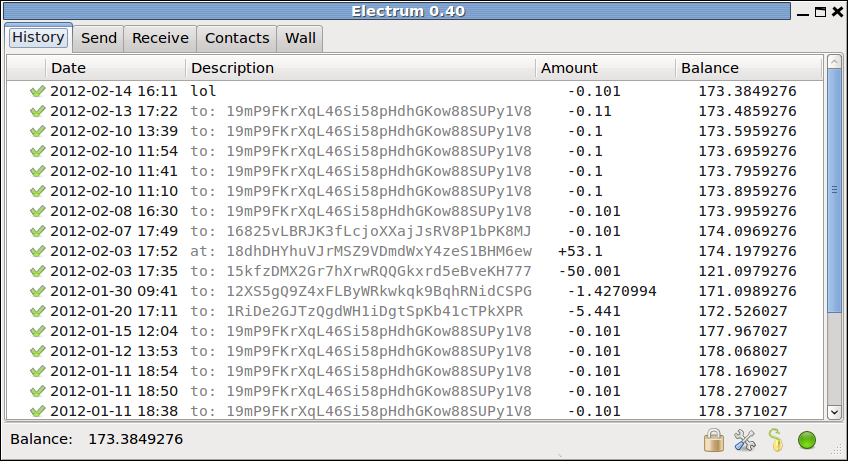Electrum: Difference between revisions
NotATether (talk | contribs) Begin add signature verification steps |
NotATether (talk | contribs) m →Downloading and Verification: grammar error |
||
| Line 31: | Line 31: | ||
gpg --sign-key 6694D8DE7BE8EE5631BED9502BD5824B7F9470E6'' | gpg --sign-key 6694D8DE7BE8EE5631BED9502BD5824B7F9470E6'' | ||
Then you download the Electrum program and | Then you download the Electrum program and its signature to the same folder, and check it's authenticity with the following GPG command: | ||
''gpg --verify /<path>/<to>/<file>/<location>/<filename>.asc'' | ''gpg --verify /<path>/<to>/<file>/<location>/<filename>.asc'' | ||
Revision as of 21:40, 18 April 2021

Electrum is a lightweight Bitcoin client, based on a client-server protocol. It was released on 5 November 2011.
Main features
- Encrypted wallet: the file that contains bitcoin private keys is protected with a password, and never leaves the user's computer.
- Deterministic key generation: If you lose your wallet file, you can recover it from its seed. You are protected from your own mistakes. (Note that Electrum's seed phrase is not according to the BIP39 standard.)
- Instant on: by default the client does not download the blockchain, it requests that information from a server. No delays, always up-to-date.
- Transactions are signed locally: Your private keys are not shared with the server. You do not have to trust the server with your money.
- Cold storage: Keeping private keys offline is supported. Has a watch-only mode for online use.
- Multi-signature: Dividing the power to spend coins between multiple wallets is supported.
- Hardware wallet integration: Many leading hardware wallets can interface with Electrum, including Coldcard, Trezor and Ledger.
- Redundancy: You are not tied to a particular server, and the server does not need to know you. One server going down doesn't cause user downtimes.
- No single point of failure: The server code is open source, anyone can run a server. Private keys can be exported and imported into other wallets.
- Firewall friendly: The client does not need to open a port, it simply polls the server for updates.
- Free software: MIT License. Anyone can audit the code.
- Written in Python. The code is short, and easy to review.
- Add-ons: third-party plugins are supported.
- Support for Bitcoin URIs, signed URIs and Bitcoin aliases
Downloading and Verification
Electrum binaries can be downloaded from https://electrum.org/#download. Next to each download link there is also a signature file which can be downloaded. The signature files are for independently verifying the Electrum files were not tampered with. This step should not be overlooked as users have reported malicious funds-stealing builds of Electeum existing in the wild.
To verify the Electrm binaries using the signatures, you need to have GPG installed. After that, you run the following GPG commands to import and trust the key which Electrum binaries are signed with, and the signature files are made from:
gpg --keyserver keys.gnupg.net --recv-keys 6694D8DE7BE8EE5631BED9502BD5824B7F9470E6 gpg --sign-key 6694D8DE7BE8EE5631BED9502BD5824B7F9470E6
Then you download the Electrum program and its signature to the same folder, and check it's authenticity with the following GPG command:
gpg --verify /<path>/<to>/<file>/<location>/<filename>.asc
This is the path to the signature file you downloaded. If verification succeeds, you will get output indicating that the verification was successful.
Documentation
Documentation is hosted on http://docs.electrum.org/.
It includes tutorials for the multi-signature, cold storage and hardware wallet features.
History
Electrum was announced 5 November 2011.[1]
Server software
The server code is open source, anyone can run a server. There are several implementations.
Public Electrum servers run by strangers can easily spy on Electrum users. For this reason many people run their own server. For maximum trustlessness, privacy and security; users should point Electrum to their own servers.
bwt
bwt is a lightweight and performant HD wallet indexer backed by a bitcoin full node that can also be installed as an Electrum plugin.
ElectrumX
ElectrumX is the latest iteration of general purpose Electrum servers. Written in Python, it tries to be as efficient as possible to keep synchronization times low. ElectrumX is able to serve thousands of clients at once, it is suited to be an always-on server that contributes to bitcoin. Make sure that the version of ElectrumX you download supports Bitcoin. As of May 2020 some versions of ElectrumX only support altcoins.
GitHub: https://github.com/spesmilo/electrumx
Electrum Personal Server
Electrum Personal Server has a different approach to a normal server. It is intended to be used by a single person only. Instead of creating a database of every transaction and address ever used on the bitcoin blockchain, Electrum Personal Server only tracks the user's own wallets. This allows it to be much more efficient with resources, it does not need any extra data files and is compatible with Bitcoin Core's pruning feature.
Electrum Personal Server is probably the best way to combine Electrum's feature-richness (hardware wallet integration, multi-signature, seed phrase, etc) with a full node's strong security and privacy.
GitHub: https://github.com/chris-belcher/electrum-personal-server
